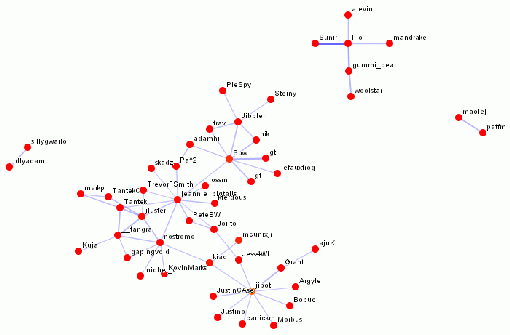

 subscribe
subscribeIt seems clear that the first epoch of the 3rd Millennium, the Network Age, was already asserting itself in increasingly powerful ways by the early 1990s, if not sooner, through the literal reorganization of the social, political, and economic infrastructure around electronic networks.[1] Samuel R. Smith
Ideas and discussions about networks and complexity are increasingly important among the most diverse communities. These range from hippies to hard-nosed business people and from radical activists to right wing reactionaries and all shades of opinion in between. The discussions range from visions of a collaborative heaven to a hell filled with terrorists, paedophiles and copyright pirates.
Whatever the vision, most seem to start from the assumption that networks are in some way a new phenomenon or at least that they are much more significant now than ever before. They are seen as either the product of, or at least encouraged by, the recent explosive growth of digital media and particularly the internet. Few commentators on the subject explore the nature of networks, except to provide a small number of examples that suit their argument.
It is common to draw parallels from the world of ants or social sciences, both pretty far removed from our everyday experience. Network scientists present us with a series of nodes (circles) and their connections (lines) often in configurations that suit their case.

PieSpy - Inferring and Visualising Social Network on IRC
Any representation will always be a simplification and often a gross one. In an important sense, networks don’t have a form. What we usually think of as a network is really a static representation of a process and of potential. Usually our representations are very limited and rarely express the complexity of the systems and connections that they represent or of the processes occurring within them.
Although there have been significant changes in science and society that encourage us to think more about networks they have not sprung up since the development of the internet and mobile phones. Those who are discussing networks are not discovering a new phenomenon but applying a different (set of) metaphors for communities and the ways in which we interact with our world.
In itself this may have a bearing on how much, and in what ways, we can take part in current developments and influence them. What is most valuable in these discussions is that they place a reinvigorated emphasis on systemic ways of thinking and how small changes in a system can make a big difference overall. This includes ideas about emergence, complexity, systemic and cybernetic thought.
In a (collaborative) paper considering the possibility of Emergent Democracy
Joi Ito quotes Howard Rheingold on the hopes that some have for a new era:
We temporarily have access to a tool that could bring conviviality and understanding into our lives and might help revitalize the public sphere. The same tool, improperly controlled and wielded, could become an instrument of tyranny. The vision of a citizen-designed, citizen-controlled worldwide communications network is a version of technological utopianism that could be called the vision of "the electronic agora." In the original democracy, Athens, the agora was the marketplace, and more--it was where citizens met to talk, gossip, argue, size each other up, find the weak spots in political ideas by debating about them. But another kind of vision could apply to the use of the Net in the wrong ways, a shadow vision of a less utopian kind of place--the Panopticon. [2],
The increasing development of networked media may allow the interconnection and networking of people and ideas, a cross-fertilisation between those from diverse cultures and with diverse knowledge. This can lead to a more active participation in making meaning, understanding where ideas come from and where they may lead us. In other words to a less canonical authorship and a more responsible audience / readership.
The World Wide Web, as it is now, lacks the feedback to facilitate this. In fact many of the most positive predictions about it becoming a liberating force are far from being realised. Technology alone will not bring positive wider change, especially when the means are separate from the ends.
Without other significant changes we may be heading towards an increasingly undifferentiated experience, where knowledge is replaced by snippets of information separated from their source. A. N. Whitehead describes the dangers of such 'inert ideas' in his Aims of Education. The development of our shared understanding of the environments and contexts of which we are part is crucial in playing an active role.
References
[1]samuel r. smith: intelligent agent vol. 3 no. 1, the political sphere, postmoderism is dead - now what.
[2] http://joi.ito.com/joiwiki/EmergentDemocracyPaper
Rheingold, Howard. (1993) Virtual Community. Retrieved February 18, 2003, from http://www.rheingold.com/vc/book/